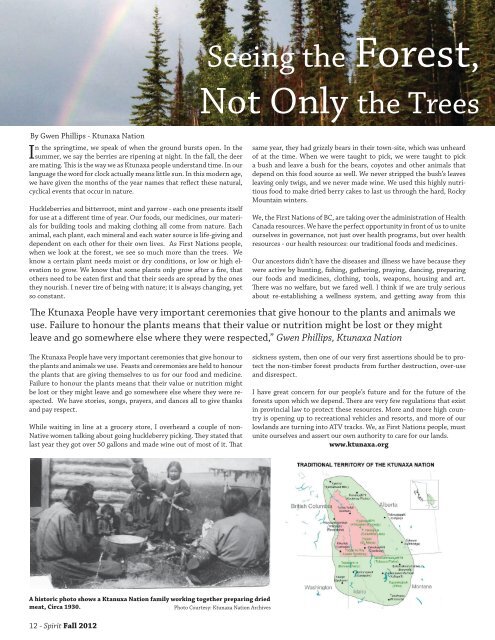1s8Zgsc
1s8Zgsc
1s8Zgsc
You also want an ePaper? Increase the reach of your titles
YUMPU automatically turns print PDFs into web optimized ePapers that Google loves.
Seeing the Forest,<br />
Not Only the Trees<br />
By Gwen Phillips - Ktunaxa Nation<br />
In the springtime, we speak of when the ground bursts open. In the<br />
summer, we say the berries are ripening at night. In the fall, the deer<br />
are mating. This is the way we as Ktunaxa people understand time. In our<br />
language the word for clock actually means little sun. In this modern age,<br />
we have given the months of the year names that reflect these natural,<br />
cyclical events that occur in nature.<br />
Huckleberries and bitterroot, mint and yarrow - each one presents itself<br />
for use at a different time of year. Our foods, our medicines, our materials<br />
for building tools and making clothing all come from nature. Each<br />
animal, each plant, each mineral and each water source is life-giving and<br />
dependent on each other for their own lives. As First Nations people,<br />
when we look at the forest, we see so much more than the trees. We<br />
know a certain plant needs moist or dry conditions, or low or high elevation<br />
to grow. We know that some plants only grow after a fire, that<br />
others need to be eaten first and that their seeds are spread by the ones<br />
they nourish. I never tire of being with nature; it is always changing, yet<br />
so constant.<br />
same year, they had grizzly bears in their town-site, which was unheard<br />
of at the time. When we were taught to pick, we were taught to pick<br />
a bush and leave a bush for the bears, coyotes and other animals that<br />
depend on this food source as well. We never stripped the bush’s leaves<br />
leaving only twigs, and we never made wine. We used this highly nutritious<br />
food to make dried berry cakes to last us through the hard, Rocky<br />
Mountain winters.<br />
We, the First Nations of BC, are taking over the administration of Health<br />
Canada resources. We have the perfect opportunity in front of us to unite<br />
ourselves in governance, not just over health programs, but over health<br />
resources - our health resources: our traditional foods and medicines.<br />
Our ancestors didn’t have the diseases and illness we have because they<br />
were active by hunting, fishing, gathering, praying, dancing, preparing<br />
our foods and medicines, clothing, tools, weapons, housing and art.<br />
There was no welfare, but we fared well. I think if we are truly serious<br />
about re-establishing a wellness system, and getting away from this<br />
The Ktunaxa People have very important ceremonies that give honour to the plants and animals we<br />
use. Failure to honour the plants means that their value or nutrition might be lost or they might<br />
leave and go somewhere else where they were respected,” Gwen Phillips, Ktunaxa Nation<br />
The Ktunaxa People have very important ceremonies that give honour to<br />
the plants and animals we use. Feasts and ceremonies are held to honour<br />
the plants that are giving themselves to us for our food and medicine.<br />
Failure to honour the plants means that their value or nutrition might<br />
be lost or they might leave and go somewhere else where they were respected.<br />
We have stories, songs, prayers, and dances all to give thanks<br />
and pay respect.<br />
While waiting in line at a grocery store, I overheard a couple of non-<br />
Native women talking about going huckleberry picking. They stated that<br />
last year they got over 50 gallons and made wine out of most of it. That<br />
sickness system, then one of our very first assertions should be to protect<br />
the non-timber forest products from further destruction, over-use<br />
and disrespect.<br />
I have great concern for our people’s future and for the future of the<br />
forests upon which we depend. There are very few regulations that exist<br />
in provincial law to protect these resources. More and more high country<br />
is opening up to recreational vehicles and resorts, and more of our<br />
lowlands are turning into ATV tracks. We, as First Nations people, must<br />
unite ourselves and assert our own authority to care for our lands.<br />
www.ktunaxa.org<br />
A historic photo shows a Ktanuxa Nation family working together preparing dried<br />
meat, Circa 1930.<br />
Photo Courtesy: Ktunaxa Nation Archives<br />
12 - Spirit Fall 2012


